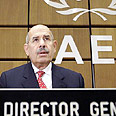
Mohamed ElBaradei also said his agency is still in the dark about possible military applications of what Iran says is a purely civilian nuclear program. However, he praised the Islamic Republic for providing long-sought answers about its nuclear past.
ElBaradei spoke at the start of a two-day meeting of the IAEA's 35-nation board that will focus on his report outlining the progress of the nuclear probe. The report is also crucial in expected UN Security Council deliberations on whether to agree to a third set of sanctions against Tehran for refusing to suspend uranium enrichment.
The report, forwarded to the 35 nations last week, gives Tehran mixed marks. It suggests as far as the agency can determine Iran has told the truth about its black market purchases of centrifuge technology used to enrich uranium, but points out the IAEA is unable to look at the present status of centrifuge development until the Islamic republic restores fuller inspection rights to agency experts.
"The agency has not been able to verify some important aspects of Iran's nuclear program...relevant to the scope and nature of Iran's enrichment activities as well as...other activities that could have military applications," ElBaradei said.
While praising the increased level of cooperation shown by Iran in the past two months, he said his agency couldn't provide "credible assurance about the absence of undeclared nuclear material and activities."
And he said the IAEA's knowledge about Iran's current nuclear activities has " diminished" since Iran rescinded fuller inspection rights last year.















